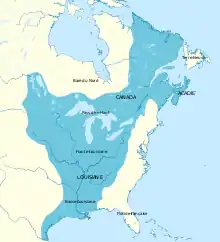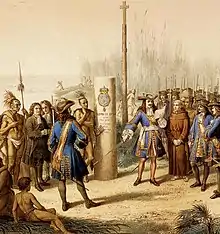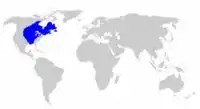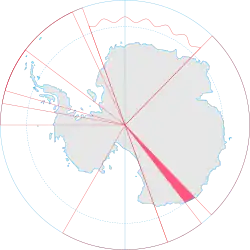From the 16th to the 17th centuries, the First French colonial empire stretched from a total area at its peak in 1680 to over 10,000,000 km2 (3,900,000 sq mi), the second largest empire in the world at the time behind only the Spanish Empire.[1][2] During the 19th and 20th centuries, the French colonial empire was again the second largest colonial empire in the world only behind the British Empire; it extended over 13,500,000 km2 (5,200,000 sq mi)[3][4] of land at its height in the 1920s and 1930s. However, on the eve of World War II, France and her colonial possessions totalled only 150 million inhabitants, in terms of population compared with 330 million for British India alone. The total area of the French colonial empire, with the first (mainly in the Americas and Asia) and second (mainly in Africa and Asia), the French colonial empires combined, reached 24,000,000 km2 (9,300,000 sq mi), the second largest empire in world and human history (the first being the British Empire). [5][6] The French colonial empire had an enormous impact on world history. France had about 80 colonies throughout its history, the second most colonies in the world behind only the British Empire.[7] Around 34 countries gained independence from France throughout its history, the second most in the world behind only the British Empire.[8] Over 40% of the world’s borders today, were drawn as a result of British and French imperialism.[9][10][11] In Stuart Laycock’s book, All the Countries We've Ever Invaded: And the Few We Never Got Round To, he cites that 90% of the world's countries have suffered a British invasion at some point in their history, with only 22 spared. France is the nearest rival to Britain's record with 80% of the world’s countries invaded by France with only 43 spared.[12]
France began to establish colonies in North America, the Caribbean and India, following Spanish and Portuguese successes during the Age of Discovery, in rivalry with Britain. A series of wars with Britain during the 18th century and early 19th century, which France finally lost, almost ended its colonial ambitions in these regions, and without it what some historians term the "first" French colonial empire. In the 19th century, starting with the conquest of Algiers in 1830, France began to establish a new empire in Africa and Southeast Asia.
The following is a list of all countries that were part of the French colonial empires from 1534 to the present, either entirely or in part, either under French sovereignty or as mandate.
In the Americas





- Present-day Canada
- New France (1534–1763)
- Present-day United States
- The Fort Saint Louis (Texas) (1685–1689)
- Saint Croix, U.S. Virgin Islands (1650–1733)
- Fort Caroline in French Florida (occupation by Huguenots) (1562–1565)
- Vincennes and Fort Ouiatenon in Indiana
- French Louisiana
- Louisiana (New France) (1672–1764)
- Present-day Brazil
- France Équinoxiale (Bay of São Luis) (1610–1615)
- The island of Saint Alexis (1531)
- France Antarctique, to Fort Coligny (Rio de Janeiro Bay; intended as a haven for Huguenots) (1555–1567)
- Île Delphine's island (1736–1737)
- Present-day Haiti
- St. Domingue (1627–1804)
- Present-day Dominican Republic (1795–1809)
- Present-day Suriname
- Tapanahony (District of Sipaliwini) (Controversial Franco-Dutch in favour of the Netherlands) (25.8% of the current territory) (1814)
- Present-day Saint Kitts and Nevis
- Saint Christopher Island (1628–1690, 1698–1702, 1706, 1782–1783)
- Nevis (1782–1784)
- Present-day Antigua and Barbuda
- Antigua (briefly in 1666)
- Present-day Trinidad and Tobago
- Tobago (1666–1667, 1781–1793, 1802–1803)
- Dominica (1625–1763, 1778–1783)
- Grenada (1650–1762, 1779–1783)
- Saint Vincent and the Grenadines (1719–1763, 1779–1783)
- Saint Lucia (1650–1723, 1756–1778, 1784–1803)
- Montserrat (1666, 1712)
- Falkland Islands (1504, 1701, 1764–1767)
- Îles des Saintes (1648–present)
- Marie-Galante (1635–present)
- la Désirade (1635–present)
- Guadeloupe (1635–present)
- Martinique (1635–present)
- French Guiana (1604–present)
- Saint Pierre and Miquelon (1604–1713, 1763–present)
- Collectivity of Saint Martin (1624–present)
- Saint Barthélemy (1648–1784, 1878–present)
- Clipperton Island (1858–present)
In Southern Europe
In Africa
.jpg.webp)
French North Africa
- French Algeria (1830–1962)
- Protectorate of Tunisia (1881–1956)
- Protectorate in Morocco (1912–1956)
French West Africa
- Ivory Coast (1843–1960)
- Dahomey or French Dahomey (now Benin) (1883–1960)
- Independent of Dahomey, under French protectorate in 1889
- Porto-Novo (protectorate) (1863–1865, 1882)
- Cotonou (protectorate) (1868)
- French Sudan (now Mali) (1883–1960)
- Senegambia and Niger (1902–1904)
- Guinea or French Guinea (1891–1958)
- Mauritania (1902–1960)
- Adrar emirate (protectorate) (1909)
- The Tagant confederation's emirate (protectorate) (1905)
- Brakna confederation's emirate (protectorate)
- Emirate of Trarza (protectorate) (1902)
- Niger (1890–1960)
- Sultanate of Damagaram (Zinder) (protectorate) (1899)
- Senegal (1677–1960)
- French Upper Volta (now Burkina Faso) (1896–1960)
- French Togoland (1918–1960) (formerly a German colony, mandate became a French colony) (now Togo)
- Nigeria
- The Enclaves of Forcados and Badjibo (territory under a lease of 30 years) (1900–1927)
- The Emirate of Muri (Northeast of Nigeria) (1892–1893)
- Gambia
- Albreda (1681–1857)
- Kunta Kinteh Island (1695–1697, 1702)
French Equatorial Africa
- Chad (1900–1960)
- Oubangui-Chari (currently Central African Republic) (1905–1960)
- Dar al Kuti (protectorate) (1897) (in 1912 its sultanate was suppressed by the French)
- Sultanate of Bangassou (protectorate) (1894)
- Present-day The Republic of Congo, then French Congo (1875–1960)
- Gabon (1839–1960)
- French Cameroon (91% of current Cameroon) (1918–1960) (formerly a German colony, Mandate, Protectorate then French Colony)
- São Tomé and Príncipe (1709)
East Africa and Indian Ocean
- Madagascar (1896–1960)
- Kingdom of Imerina (protectorate) (1896)
- Isle de France (1715–1810) (now Mauritius)
- Djibouti (French Somaliland) (the French Territory of the Afars and the Issas) (French Somalia) (1862–1977)
- Mayotte (1841–present)
- Seychelles (1756–1810)
- Chagos Archipelago (1721–1745, 1768–1814)
- The Scattered Islands (Banc du Geyser, Bassas da India, Europa Island, Juan de Nova Island, Glorioso Islands, Tromelin Island)
- Comoros (1866–1975)
- Réunion (1710–present)
In Asia
- French Indochina
- French Indochinese Union (1887–1954)
- Laos (protectorate) (1893–1953)
- Cambodia (protectorate) (1863–1953)
- Vietnam
- Cochinchina (Southern Vietnam) (1858–1949)
- Annam (protectorate) (Central Vietnam) (1883–1949)
- Tonkin (protectorate) (Northern Vietnam) (1884–1949)
- State of Vietnam (1949–1954)
- Spratly Islands (1933–1939)
- Paracel Islands (1933–1939)
- Some territories in the eastern part of Thailand (independent state, but after Franco-Siamese War in 1893, Thailand has lost 3 provinces during the next 15 years)
- Chanthaburi Province (1893-1904)
- Trat Province (1904-1907)
- Dan Sai District (in the area of the Loei Province: 1903-1907)
- French Indochinese Union (1887–1954)
- India
- French Establishments of India, composed of Pondichéry (1765–1954); Karikal (1725–1954); Mahé (1721–1954) Yanaon (1723–1954); Chandannagar (1673–1952)
- China
- The territory of Kouang-Tchéou-Wan, a dependency of French Indochina) (1898–1945)
- Syria or French Syria (1920–1946) (French Mandate of Syria)
In Oceania
- French Polynesia
- Society Islands (became a French protectorate in 1843 and a colony in 1880)
- Tuamotu Archipelago
- Marquesas Islands (under French control in 1870, and later incorporated into the territory of French Polynesia)
- Gambier Islands
- Mangareva (protectorate) (1844/1871)
- Austral Islands
- Rurutu (Austral Islands) (protectorate) (1858–1889)[13]
- Papua New Guinea
- New Ireland (1880–1882) (attempt at colonization, unofficial)
- New Caledonia
- The New Hebrides (Vanuatu)
- Anglo-French condominium (1906–1980)
- Australia
- Dirk Hartog Island (1772) (made an unofficial annexation for all Australia)[14][15][16]
- Wallis and Futuna (1887–present)
In Antarctica

- French Southern and Antarctic Lands (TAAF)
- Crozet Islands (24 January 1772[17]– present)
- Kerguelen Islands (13 February 1772[18]– present)
- Île Amsterdam (in 1843 but abandoned) (1892–present)
- Île Saint-Paul (in 1843 but abandoned) (1892–present)
- Adélie Land (1840–present) (sheltering one of two French Bases in Antarctica, the other one being Franco-Italian) (that borders with the Australian Antarctic Territory on both sides and divides that in two)
See also
- First French Empire
- Second French Empire
- CFA franc
- Franco-Trarzan War of 1825
- French Africa
- French colonial flags
- French Colonial Union
- French colonization of the Americas
- Kouang-Tchéou-Wan – a small French territory in China
- Organisation internationale de la Francophonie
- Overseas France
- Timeline of the European colonization of North America
- Troupes coloniales – French colonial forces
Notes and references
- ↑ "Western colonialism - European expansion since 1763". Encyclopedia Britannica. Retrieved 2021-08-20.
- ↑ Havard, Vidal, Histoire de L’Amérique française, Flammarion, 2003, p. 67.
- ↑ Robert Aldrich, Greater France: A History of French Overseas Expansion (1996) p 304
- ↑ Melvin E. Page, ed. (2003). Colonialism: An International Social, Cultural, and Political Encyclopedia. ABC-CLIO. p. 218. ISBN 9781576073353. Archived from the original on 19 November 2021. Retrieved 23 December 2021.
- ↑ Robert Aldrich, Greater France: A History of French Overseas Expansion (1996) p 304
- ↑ Melvin E. Page, ed. (2003). Colonialism: An International Social, Cultural, and Political Encyclopedia. ABC-CLIO. p. 218. ISBN 9781576073353. Archived from the original on 19 November 2021. Retrieved 23 December 2021.
- ↑ Shillington, Kevin (2005). Encyclopedia of African history. New York: CRC Press, p. 878
- ↑ David Armitage, The Declaration of Independence in World Context, Organization of American Historians, Magazine of History, Volume 18, Issue 3, Pp. 61–66 (2004)
- ↑ Manning, Patrick (1990). Slavery and African Life: Occidental, Oriental, and African Slave Trades. London: Cambridge University Press.
- ↑ Lovejoy, Paul E. (2012). Transformations of Slavery: A History of Slavery in Africa. London: Cambridge University Press.
- ↑ Martin Klein, "Slave Descent and Social Status in Sahara and Sudan", in Reconfiguring Slavery: West African Trajectories, ed. Benedetta Rossi (Liverpool: Liverpool University Press, 2009), 29.
- ↑ Seymour, Richard, "The British have invaded 90% of the world's countries. Ha ha?", The Guardian (London), 6 November 2012
- ↑ "Drapeau de Rurutu - Tahiti Heritage". www.tahitiheritage.pf. Archived from the original on 10 October 2014. Retrieved 23 September 2017.
- ↑ "Consulter le sujet - L'Australie serait-elle française ?!... • [Forums". Francedownunder.com. Retrieved 2011-03-26.
- ↑ Godard, Philippe; Kerros, Tugdual de; Margot, Odette; Stanbury, Myra; Baxter, Sue; Western Australian Museum; Godard, Phillippe; De Kerros, Tugdual; Margot, Odette; Stanbury, Myra; Baxter, Sue (2008), 1772 : the French annexation of New Holland : the tale of Louis de Saint Aloürn, Western Australian Museum, ISBN 978-1-920843-98-4
- ↑ Philippe Godard, Tugdual de Kerros 2002, "Louis de Saint Aloüarn, un marin breton à la conquête des terres australes", Les Portes du large, Saint-Jacques-de-la-Lande, 331-336
- ↑ "TAAF". Taaf.fr. Archived from the original on 2012-01-20. Retrieved 2012-01-10.
- ↑ "Kerguelen – yves trémarec – james cook – asia – hillsborough – rhodes". Kerguelen-voyages.com. Archived from the original on 2013-10-02.